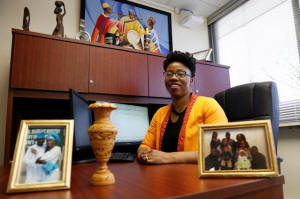|
For one U.S. immigrant family, short-term
public aid meant long-term security
 Send a link to a friend
Send a link to a friend
 [February 14, 2018]
By Yeganeh Torbati [February 14, 2018]
By Yeganeh Torbati
WASHINGTON (Reuters) - When Abosede
Akingbade Thomas, a Nigerian immigrant to the United States, was ordered
to bed rest in 1981 during a difficult pregnancy, she followed her
doctor's advice to sign up for food stamps and another aid program
providing support to pregnant and nursing women.
At the time, as now, the kind of assistance she and her husband received
was not generally held against foreigners if they later applied for
permanent residence.
But under a draft policy being considered by the Trump administration,
people like the Thomases who relied on the government to get through
tough financial times could find it more difficult to stay in the United
States permanently.
Without that few months of help, Akingbade Thomas says, and without her
income as a nurse, her husband would likely have had to quit his
engineering studies to take on another job.
"We had to pay for food, it was a need that I had to eat," Akingbade
Thomas, 65, said.

Soon after the birth of her daughter, Akingbade Thomas became a U.S.
citizen, and was able to sponsor her husband, who had come to the United
States from Nigeria on a student visa, for a green card.
The Department of Homeland Security draft policy, first reported by
Reuters last week, would allow immigration officers reviewing
applications for permanent residency to consider whether foreign-born
people seeking to live in the United States sought or received a range
of public benefits for themselves or their dependents, including
American-born children. [nL2N1PY2H4]
The government could factor in use of public benefits, including food
aid, home heating assistance, subsidies for health insurance premiums,
and government pre-school programs, when deciding if a person is likely
to become a "public charge." Such a determination would bar them from
becoming permanent residents.
The proposal has been both criticized and praised. Supporters say
self-sufficiency is an important criterion when considering immigration
decisions and that concerns about the draft rule were exaggerated.
A DHS spokesman declined to comment on the draft policy beyond a
statement last week that the Trump administration seeks to be "good
stewards of taxpayer funds."
Omolara Uwemedimo, the Thomases' eldest daughter and the baby Akingbade
Thomas was carrying at the time she received government aid, is now a
36-year-old pediatrician who treats poor children in New York. She is a
critic of the draft plan.
As a child growing up in Brooklyn and Queens, Uwemedimo excelled
academically, graduated from high school at age 15 and won a scholarship
to cover her undergraduate and medical school tuition. At age 22, she
received her medical degree.
Many of Uwemedimo's patients have parents who were born in other
countries, she said in an interview. Over half her patients are covered
by Medicaid or the Children's Health Insurance Program, government
benefits that help low-income families with medical costs.
Uwemedimo said the new rule could force parents to decline health
insurance and food aid for their American-born children, for fear of
losing their shot at permanent residency. Shunning government help, she
says, would "push a tremendous number of families into poverty."
[to top of second column]
|

Doctor Omolara Uwemedimo, a pediatrician at Cohen's Children's
Medical Center, poses at her office in New Hyde Park, New York,
U.S., February 13, 2018. Picture taken February 13, 2018.
REUTERS/Shannon Stapleton

Uwemedimo said her own family's experience taught her some of the
hardships immigrants can face. "Ultimately that transition, even for
people who came as skilled workers, it was still quite difficult," she
said.
President Donald Trump, who took a hard line on illegal immigration
during the 2016 election campaign, has also sought to curtail legal
immigration. He has advocated ending a visa lottery program and some
kinds of family-based immigration.
Critics of the draft rule believe it would effectively make it harder
for lower- and middle-income people to immigrate.
Jessica Vaughan, director of policy studies at the Center for
Immigration Studies, which favors immigration restrictions, said she
does not believe the draft rule intends to deter people from accessing
services.
"It's to make sure that the United States is not giving out green cards
to people who don't qualify because they're not self-sufficient,"
Vaughan said.
Robert Rector, an expert on welfare programs and immigration at the
conservative Heritage Foundation, said cases such as the Thomas family -
educated immigrants who rely for a short time on public benefits - are
not typical of the burden on U.S. taxpayers posed by immigrants
generally.
Though Rector supports the draft regulation's aims of reducing the
burden of immigration on taxpayers, he said a more efficient way of
doing so would be changing the law to limit the number of low-skilled
immigrants who can be admitted.

"The solution is not to bring them into the country and then say, 'Oh
we're going to monitor every month of food stamps you get,'" he said.
"The proper policy is to make a distinction at the front door."
Cornelius Thomas, Uwemedimo's father, is grateful he did not have to
worry about jeopardizing his chance at permanent residency when his
family accepted government aid for about six months. After earning his
engineering degree, he worked two jobs for years. His wife worked as a
nurse and now runs a home health care business.
It was the only time the family received public benefits, Cornelius
Thomas said.
"The amount we paid back, it's more than what they gave us," he said,
referring to taxes they paid for decades. "We never stopped working."
(Reporting by Yeganeh Torbati, editing by Sue Horton and Grant McCool)
[© 2018 Thomson Reuters. All rights
reserved.]
Copyright 2018 Reuters. All rights reserved. This material may not be published,
broadcast, rewritten or redistributed.
Thompson Reuters is solely responsible for this content. |